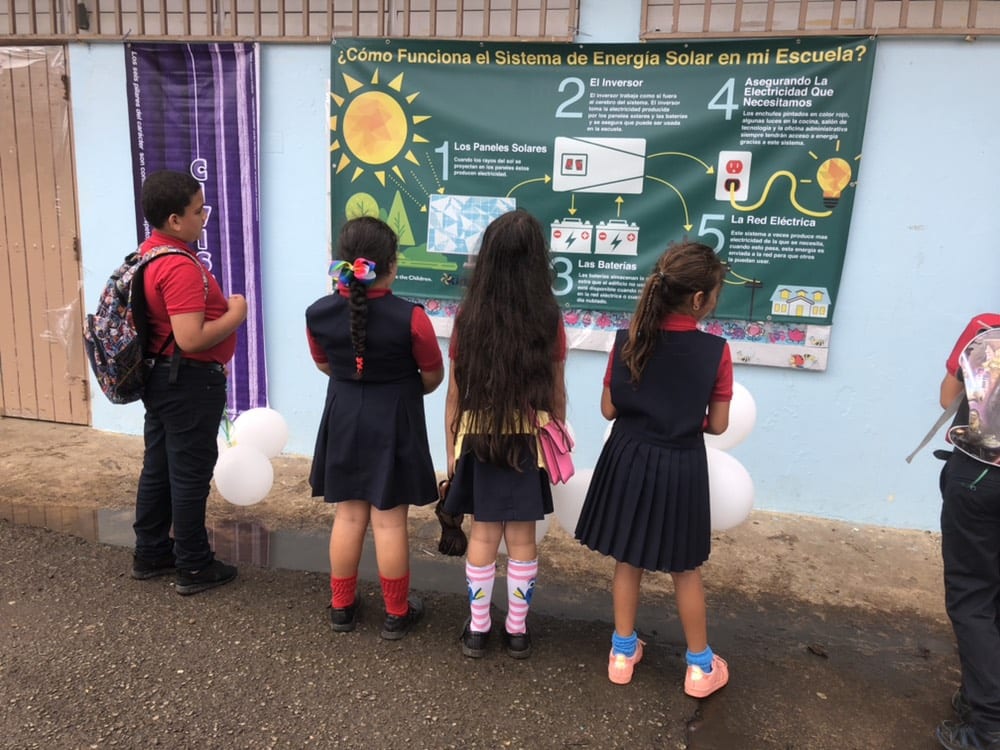
Public School Renewable Microgrid Opens in Orocovis
Orocovis, Puerto Rico, September 27, 2018 – This week, Rocky Mountain Institute (RMI), Save the Children and the Kinesis Foundation inaugurated a solar microgrid system in a public elementary school in central Puerto Rico. The primary school Ángel Rafael “Papo” Díaz Colón, in Orocovis, Puerto Rico, is the first of up to 12 schools to benefit from microgrid technology under this program.

After Hurricane Maria, this school went five months without a full day of school due to a lack of electricity. Now, thanks to a 15 kW solar photovoltaic array and a 34 kilowatt-hour (kWh) lithium-ion battery system, this school can ensure that its 234 students have a more resilient school to depend on. Four groups collaborated on the project—NetHope provided internet services powered by a solar and battery system, Kinesis Foundation, a nonprofit public educational foundation, provided financial support, Save the Children focused on building resilience through educational and after-school programing with the schools and communities, and RMI managed the technical aspects of the microgrid project. The funding partners for this project include Kinesis Foundation and other generous donors.
“Hurricane Maria had a devastating impact on the lives of children across Puerto Rico. But together with RMI and NetHope, Save the Children is incredibly proud to help bring light back to the children of Puerto Rico,” said Luis Soto, Puerto Rico Director for Save the Children. “Knowing that hundreds of children in 12 of the most affected municipalities will benefit from microgrids at their schools, resulting in reliable power and therefore learning, is a collaboration worth celebrating. When we grow the resiliency of communities and schools, children flourish.”
“This new system is vital to keeping Papo―and the other schools that will come online―operating consistently and sustainably. Not only does it provide an important lesson to the students about how they directly benefit from renewable energy, but it also illustrates the power of a collaborative approach to completing these projects. Partnerships likes those between NetHope members and partners like Save the Children and RMI demonstrate the collective impact of groups working in cooperation,” said Rami Shakra, NetHope’s Director of Global Programs.
“RMI values our strong working relationship with Save the Children as we strive to ensure Puerto Rico’s future leaders have access to an uninterrupted education. We are pleased to showcase how microgrids can provide resilient energy service at the Papo school today. It will provide not only a dependable source of power for the students, but also illustrate to pupils and the surrounding communities how renewable generation works in Puerto Rico and can keep the lights on in years to come,“ said Roy Torbert, Principal at RMI.
“As a public nonprofit education organization, we are grateful for our donors who have believed in the Kinesis Foundation as the ideal organization to contribute to the education and economic development of Puerto Rico. Their help has represented as an act of resilience and relief both for the needs of schools and citizens of Puerto Rico after Hurricane Maria struck Puerto Rico”, said Luis Gautier, Marketing Communications and Corporate Advancement, Kinesis Foundation.
“We are more than grateful for the Rocky Mountain Institute and Save the Children’s generous gift to this school. The students of Ángel Rafael “Papo” Díaz Colón will from now on have a school that will always be open for them and for the community of Saltos. We know that this project will have a lasting impact on our students and our school’s community. Thank you,” said school principal Rosa Soto Santiago.”
During construction and operation, the system serves as a teaching model for the school and, in the future, can help demonstrate new ways of partnering with the utility. The school principal has marked this important moment by hosting a “Solar Celebration.” The celebration showcases student work related to renewable energy and hosts different learning opportunities where students, parents and community members can learn about renewable energy, energy efficiency and the microgrid installed at the school.
This project marks the start of a larger initiative to install systems in schools in 12 of the municipalities that were most impacted by Hurricane Maria. Similar systems are appearing throughout Puerto Rico, illustrating that positive transformation is possible in the aftermath of disaster.
Contact: Nick Steele, media@rmi.org and Sara Neumann, sneumann@savechildren.org or (203) 209-6545 for Save the Children
**********
About Save the Children
Save the Children gives children in the United States and around the world a healthy start, the opportunity to learn and protection from harm. We invest in childhood — every day, in times of crisis and for our future. Follow us on Facebook, Instagram and Twitter.
About Rocky Mountain Institute
Rocky Mountain Institute (RMI)—an independent nonprofit founded in 1982—transforms global energy use to create a clean, prosperous, and secure low-carbon future. It engages businesses, communities, institutions, and entrepreneurs to accelerate the adoption of market-based solutions that cost-effectively shift from fossil fuels to efficiency and renewables. RMI has offices in Basalt and Boulder, Colorado; New York City; Washington, D.C.; and Beijing.
About NetHope
NetHope enables committed organizations to change the world through the power of technology. Bringing together global leaders in the nonprofit and technology sectors, we embrace big challenges through innovation and collaboration in a unique model that has proven to have powerful results for more than a decade.
About Kinesis Foundation
Our mission is to contribute to the social and economic transformation of Puerto Rico by providing students with the necessary resources to overcome social boundaries and economic limitations in order to achieve excellence. We seek to transform Puerto Rico by helping talented students with financial need in Puerto Rico overcome socioeconomic barriers and achieve excellence at the highest academic levels to ensure they get the best jobs in the future.